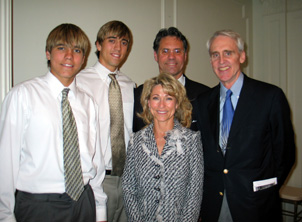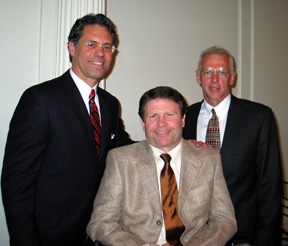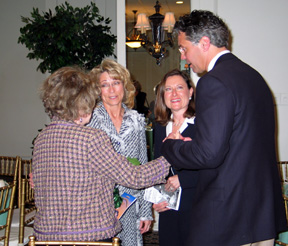 |
Rik and Shannon Bonness with their sons, Alex, left, and Eric, and JDRF President and CEO Peter Van Etten, far right. |
Since then, Rik and Shannon Bonness have been strong advocates for medical research nationally and locally, including at the University of Nebraska Medical Center. On Monday, Nebraskans for Research honored the Omaha couple for being champions of life-saving medical research and working tirelessly to ensure that promising research, including embryonic stem cell research, can be conducted in the United States and in Nebraska.
“Shannon and I truly believe there is a ‘miracle’ in our future – cures for disease and spinal injuries,” Rik Bonness told more than 230 people, who gathered at the Happy Hollow Club for the tribute luncheon.
Just as medical research has made it possible for some children to replace insulin injections with insulin pumps, the couple is confident there are opportunities to improve the lives of the 1.5 million children with juvenile diabetes, as well as those touched by cancer, Parkinson’s, Alzheimer’s and other diseases.
As an anesthesiologist for the Alegent Health System, Shannon Bonness said she often sees patients in their 20s, 30s and early 40s battling the complications of Type I diabetes including kidney failure, blindness, heart disease and limb amputations.
 |
Former University of Nebraska football players and roommates Rik Bonness, Tom Heiser, M.D., and Bob Martin. Dr. Heiser is a UNMC alumnus and longtime supporter of the medical center. The strength and fitness facility in the Center for Healthy Living is named in his honor. Martin went on to play with the New York Jets and is now with Valmont Industries. |
Stem cell research – embryonic and adult – will advance medical knowledge in diabetes and other diseases, said Peter Van Etten, president and CEO of the Juvenile Diabetes Research Foundation, and should be allowed under strict ethical guidelines. “We should not allow a small minority to dictate science,” he said during his keynote address.
The United States plays a fundamental role in biomedical research, spending approximately $30 billion, compared to the $2 billion spent in Europe, Asia and other parts of the world, Van Etten said. “People don’t have the hope Americans have,” he said. “Americans think they can cure diseases. That’s not true in most parts of the world.”
At JDRF, the goal is simple: find a cure for juvenile diabetes and its complications. To that end, Van Etten said the foundation has provided $800 million to fund outstanding research throughout the world in the last several years.
Arguments against stem cell research also were voiced when in vitro fertilization and recombinant DNA were introduced, Van Etten said. While Nebraskans debate stem cell research legislation, California, New Jersey and Wisconsin have earmarked state funds to advance stem cell research. “The work you do is very significant, not just in Nebraska, but on a national basis,” he said.
Rik and Shannon Bonness began their juvenile diabetes advocacy campaign after their sons, Eric and Alex, had both been diagnosed with the disease by age 10. “After 13 years and nearly 70,000 needle sticks – from blood tests, insulin shots, catheter insertions and IVs – the boys remain bold and courageous, quick to smile, eager to learn and full of dreams,” Shannon Bonness said.
Eric, 20, is a sophomore at the University of Nebraska-Lincoln studying pre-med. Alex, 17, is a junior at Brownell Talbot. Eric plans to work at a diabetes camp in Atlanta this summer, while Alex plans to cover the Children’s Congress for JDRF’s Countdown magazine.
 |
Rik and Shannon Bonness, second from left, mingle with guests at the Nebraskans for Research tribute. |
In 2003, the family served as “Chair Family” for JDRF’s Children’s Congress, which gives children with Type 1 diabetes the opportunity to help members of Congress understand why research to find a cure for diabetes and its complications is so critical.
Rik Bonness is a partner at the law firm Kutak Rock and specializes in real estate finance. He received his undergraduate degree from the University of Nebraska-Lincoln, where he also excelled on the football field. He received his MBA from Arizona State University while playing professional football (Oakland Raiders and Tampa Bay Buccaneers) and later earned his law degree from Cornell Law School.
Shannon Bonness received her undergraduate degree from Arizona State University and her master’s degree in nutritional biochemistry from Cornell University. She went on to earn her medical degree from UNMC. She also completed a medical internship in obstetrics and gynecology and a medical residency in anesthesiology.
Nebraskans for Research is a not-for-profit, membership-supported public education and advocacy organization.